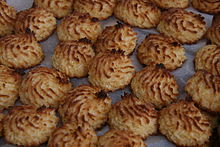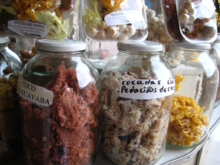Cocadas
Cocadas are traditional sweets made from desiccated coconut , egg, and sugar that are widely used in Latin America . Cocadas were mentioned in Peru as early as 1878. They are especially popular in Mexico , Argentina , Brazil , Colombia , Venezuela and Chile . Cocadas are baked in the oven but served at room temperature to keep the texture soft. They are shaped into balls or, depending on their consistency, offered as a highly viscous paste or as a block. Thanks to modern food coloring, cocadas no longer have the traditional golden brown color, but can be colored as desired. They are often garnished with grated or whole almonds. There are hundreds of recipes for cocadas, from the typical hard, very sweet balls to softer ones that can be almost pudding-like. Often fruits, also dried ones, are added to create a greater variety of colors and flavors.
By country
Mexico
In Tecolutla in 2014 as part of the Festival del Coco, the longest cocada in the world, at 231 meters, was baked in a long baking pan.
Brazil
In Brazil , cocadas come from the northeast of the country as a traditional sweet . A Brazilian variant is the black cocada, which is prepared with raw sugar and browned coconut. The phrase "rei da cocada preta" (king of the black cocadas) refers to an arrogant person who thinks they are better than others.
Venezuela
In Venezuela , the word "cocadas" refers to a drink that is mixed with coconut. The sweet, on the other hand, is called “conserva de coco”.
Individual evidence
- ↑ Raimondi, A. (1878) "On the physical geography of Peru - II" Globus 36: pp. 173–175, page 174
- ↑ a b Mounts, Deborah “Cocada Dessert Recipe” ( Memento from June 9, 2011 in the Internet Archive ) BellaOnline
- ^ "Cocada Dulce" Spanish, accessed March 5, 2010.
- ^ Reichel-Dolmatoff, Gerardo and Reichel-Dolmatoff, Alicia (1961) The people of Aritama: the cultural personality of a Colombian mestizo village University of Chicago Press, Chicago, p. 63, OCLC 1488921 .
- ↑ Article on "El Mexicano". Retrieved May 9, 2015 .
Web links
- Mexico Cooks! , Photographs of cocadas.


